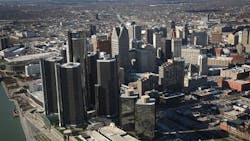As Detroit Exits Bankruptcy New Hope and Old Woes
After the largest municipal bankruptcy in U.S. history, Detroit hopes outsiders see its potential and not its history of racial conflict, financial crisis and dramatic population loss.
The city, founded as a small French fort on the Detroit River that grew to be a hub of the global auto industry, emerged from bankruptcy last month after shedding almost $7 billion of its roughly $18 billion debt.
Under the bankruptcy provisions, city workers made concessions and the healthcare coverage of pensioners was reduced -- but the pensions themselves remained largely intact.
"Working together, we can transform the city," said Mary Barra, chief executive of General Motors, the city's most famous corporate resident, after a judge approved the exit from bankruptcy.
"And you can see clear progress in the restoration of downtown, the entrepreneurs who are flocking here, the massive building projects getting underway and the work being done to improve education, neighborhoods and city services," she said.
And in a boost to remaining civic pride, the Detroit Institute of Arts' famous collection, with paintings by Vincent van Gogh and Brueghel, remained intact thanks to donations by foundations and private individuals. More galleries are now opening in the city.
In the Russell Street Delicatessen in the 124-year-old Eastern Market, the center of the Detroit's whole sale food business and one of the city's major attractions, patrons line up for tables. "We're packed like this every Saturday," said waiter Kamaul Prendergrass.
Work is also progressing on other fronts. Rock Ventures, one of the companies spawned the billionaire landowner Dan Gilbert, has commissioned one of New York's most popular architects, SHoP, for new development on the long-vacant site of the vanished Hudson's Department Store on Woodward Avenue, the city's principal thoroughfare.
There is a new three-mile rail line along Woodward, which is lined with several new office, medical and residential developments up into the bustling midtown area.
But some of the old problems have not gone away.
Vandals and 'Scrappers'
Detroit's housing stock, mostly built during the first half of the 20th century, continues to melt away under the pressure of de-population.
The city's population has dropped from 1.6 million in 1960 to around 800,000 today, and most of the jobs created by a recovery of auto sales are in Detroit's suburbs.
The outward migration has left thousands of houses vacant and open to vandals and "scrappers", who tear out the plumbing and electrical wiring and sell it.
Detroit's city government now has plans to demolish more than 20,000 vacant houses over the next several months with assistance from the federal government.
The city's public transit system, despite the construction of the new rail line, is generally considered one of the worst of any major city in the United States.
Residents can take hours to commute by bus from one part of the city to another.
The sprawling west side, now home to the majority of city residents, continues to deteriorate, with well-kept homes sitting side-by-side with abandoned property.
"Not all that much has changed," noted one city firefighter stationed at Engine 29 on Jefferson, who declined to give his name because he wasn't authorized to speak to the press.
Detroit's well-deserved reputation for violence hasn't been curbed.
While the crime rate has dropped, the city still has the highest murder rate and violent crime rate of any city with a population of over 100,000, according to the Federal Bureau of Investigation.
With budget cuts reducing the police force to just 2,300 officers, Detroit Police Chief James Craig has suggested the best thing residents can do is buy a gun.
-Joe Szczesny, AFP
Copyright Agence France-Presse, 2015
About the Author
Agence France-Presse
Copyright Agence France-Presse, 2002-2025. AFP text, photos, graphics and logos shall not be reproduced, published, broadcast, rewritten for broadcast or publication or redistributed directly or indirectly in any medium. AFP shall not be held liable for any delays, inaccuracies, errors or omissions in any AFP content, or for any actions taken in consequence.
